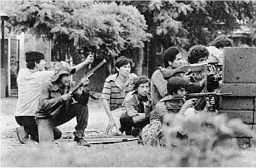“Everyone get down.”
A rock crashed through the front window of the bus. We didn’t have to be told twice. Some passengers ducked in their seats. We got on the floor. My heart raced.
The bus sped up. I looked at my companion. It was hard to see him in the dark. He seemed terrified. We held on to the seat legs for support.
“Dios mío,” said one of the women. Children cried. Rocks crashed through the side windows. Glass sprayed all around us. The bus driver laid on the horn.
A man shouted something in Spanish out the window. A rock hit him in the side of the face. Blood spattered the seat next to us. Several women screamed.
Chickens flew in the aisle. More rocks smashed windows in quick succession. The bus hopped over obstacles in the road. Men, women and children bounced up and down.
A shot rang out, then another. They came from behind us. One last rock hit the back window. The bus veered to the right in a sudden turn. The crashing rocks ceased.
“Are you alright?” I asked my companion.
Elder Morales didn’t reply. A woman next to him sobbed. He spoke to her in Spanish. He tried to comfort her. The bus slowed to a more reasonable speed.
After a moment I saw the lights of the main street ahead. The bus driver stopped at the corner. He got out and swore. “Damn those kids. Look what they did to my bus.”
We all piled out after him as fast as we could. Women gathered their children who still cried. Men stood around the bus driver. They asked him to keep going.
“They would have burned my bus if I stopped,” the driver said. “I’ve had enough of this. I’m going home.” He got back in his bus, closed the door and sped down the road.
I helped Elder Morales clean the glass out of his hair. His ear was bleeding. I gave him my handkerchief. We began the long walk back to our house outside the barrio.
We worked in Reparto Schick all day, every day. The dangers of that poor neighborhood just outside of Managua prevented us from staying there at night. We had come from a day full of meetings and visiting the people in their homes. It was Sunday, February 5, 1978.
We worked with a small church group called a branch. The leader of the branch got up in church that day and renounced his position. Then his assistant renounced. He said he didn’t want the job either. We spent the afternoon trying to convince them to stay.
“What are we going to do, Elder Morales?” We walked at a fast pace away from the shouting and fires that still burned in the barrio. “President Jimenez can’t quit like that.”
“Elder Malone, you’ve got to understand these people. There are so few that are willing to lead a church. This is the third time he’s been Branch President.”
“I know, but he can’t quit. He has to be released.” Elder Morales looked at me with a kind of sadness. He seemed so much older and wiser than his nineteen years. He was from San Jose. One eye was lop-sided. I could never tell exactly where he was looking.
“We’ll talk to President Garcia. Let him handle it.” I liked that. Give the problem to the District President where it belonged. I was going to miss Elder Morales.
This was our last full day together as companions. I was being transferred the next day to work in Bello Horizonte as a zone leader. All the missionaries in my incoming group of fourteen were about to become zone leaders. It happened with the passage of time.
The only cars on the road that night were taxis and a few busses. Very few people had cars. Sometimes a church member who drove a taxi would pick us up. Not that night.
The shouting in the distance grew louder. Army trucks rolled past us going toward the barrio. A helicopter flew in the distance. Its powerful light searched the ground below.
“Elder, I think we had better get off this road. Let’s cut through the field.” We were about five minutes from our house. The commotion was growing louder. Elder Morales agreed.
The stench of a dead dog filled our nostrils. The light from the helicopter revealed it was infested with maggots. “Maybe this wasn’t such a good idea, Elder.”
Elder Morales began to cough, then sneeze and gag. He grabbed at his face. Tears flowed from his eyes. Surely the scent of a dead dog couldn’t do this. Then it hit me.
Tear gas has a powerful effect even after several minutes. The helicopter light shone fully in our faces. A voice in Spanish over a loudspeaker demanded to know why we were there.
Neither one of us could talk. The wind from their rotor blades whipped around us. Tears blinded my eyes. My tie whipped up in my face. I held my hands up high. So did Elder Morales.
“Don’t shoot,” Elder Morales managed to shout. “We’re missionaries.” It must have been the white shirts that saved our lives. And Sandinistas don’t wear ties.
“CIA go home.” I had to laugh. The voice over the loudspeaker spoke English. It was intended for me. I waved in reply. Both arms. I waved them off. Get out of here.
We arrived home a few moments later. The doña had the usual rice and beans waiting for us. That night she added a little chicken and some plátanos in my honor.
“You’re late. Did anything interesting happen today?”
I looked at my companion.
“We had a great church meeting,” he said. “Please pass the rice.”



Seems like a scene from a really good movie!!
Thanks well written.
Pingback: Latter-day Commentary · Top 50 Most Viewed Essays